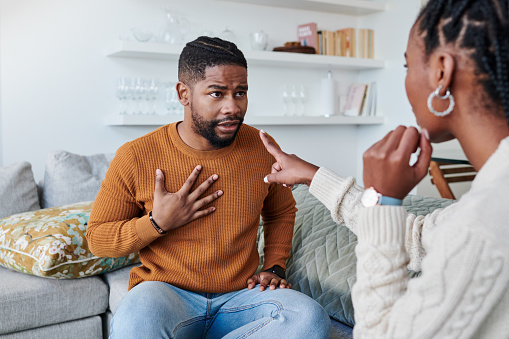
Communication is key in any relationship; I’m sure you’ve heard that before. This is because communication does so many things. It invites the other person to know our thoughts and feelings; it relays essential information; it helps the other person. It can and should be a combination of what is being said and how it is being said; non-verbal communication, such as body language, is an important factor in the effectiveness of your conversation.
In a couple’s relationship, we may communicate about facts, such as when the party starts, where the dentist’s office is, and who is coming over for dinner. We also want to be able to communicate our feelings. We want to be able to trust the other person with information about ourselves; we want to be able to say something and not have it used against us. We want to illustrate who we are and be understood by the people we trust most. How two people communicate with one another can make or break any relationship. This can make arguments feel like catastrophes, and in truth, a poorly-executed debate can be very detrimental to a couple’s relationship. This is not about the fact that you are fighting but how one or both of you may approach and communicate about the disagreement.
Are fights normal in relationships?
In a word: YES! And with very good reason. We tend to tell ourselves that we are too compatible with our partner to fight with him/her/them. Or, “If we really were compatible, we wouldn’t fight,

so we can’t fight, or it means we’re not compatible!” This is just not true. We can also tell ourselves that because we know and love our partner, we know how to resolve any conflict that might arise before it even becomes a problem. It is normal to feel that way, but it’s an impossible idea.
Firstly, no two human beings are exactly the same as one another; there will always be subjects about which you have differing opinions. Secondly, we miscommunicate or misinterpret information all the time. Your partner might have thought there was a clear understanding of what the plan was, but you were left feeling completely in the dark. Or you might be having a bad day because you rolled your ankle, so you’re in pain, and you had a tough shift at work; your partner might interpret your cloudy mood to be about them. Disagreements and misunderstandings ranging in size occur in all interpersonal relationships – why should a romantic relationship be any different?

This is why it’s important to learn how to fight fair; bad fights can hurt the relationship, leading to more resentment, disconnection, and isolation. A bad fight shuts us down emotionally, undermines us, makes us feel unsafe, and/or creates so much hurt that we can’t think about anything else.
Many of these bad fight tactics come from common communication mistakes and can be rectified. Sometimes, though, they come from a deeper issue with either of the participants, such as unresolved trauma, anger issues, depression, or any number of mental health disorders. When you are looking at improving communication with a partner, it is important that you are both aware of where each of you is coming from. The number one investment you can make in your relationship is to have each invested time and energy into yourselves as individuals.
3 Skills You Need to Have a Fair Fight in Your Couple’s Relationship
In a committed relationship, communication does not necessarily get magically easier or better in time; instead, it does so with practice. Here are some steps you can take to have more constructive and productive conversations, discussions, debates, and flat-out fights.
1. The ability to self-regulate during difficult conversations:
Better communication starts with you and how you manage your thoughts, feelings, and needs. Self-regulation is something we do in all aspects of our lives. We calm our frustration when we are cut off in traffic. We adhere to a code of conduct at our place of employment. However, when a situation feels personal, we may struggle more to do so. The more

overwhelmed you are during a difficult conversation, the more likely you are to speak out of turn and regret what you’ve said and/or how you’ve said it. Suppose these disputes trigger you and cause you to become exceptionally angry or upset. In that case, you are unlikely to be able to express your emotions and work toward a solution, which should be the intent of all debates with a partner.
To improve your ability to self-regulate, practice skills like mindfulness so you can notice when your emotional state is either changing or escalating. One of the best ways to notice a change in emotions is through our physical sensations. Do you notice your heart beating faster or your hands shaking? These are common signs of emotional dis-regulation. When you notice these physical cues, the goal is to accept them as an acknowledgment of your increased stress and do your best to meet your needs. For example, if your heart rate has increased, you can ask for a pause in which to practice some deep breathing. If you are unable to self-regulate, you may take that as a cue that you need more time to gather yourself before resuming the conversation. Individual therapy can teach emotional regulation skills and techniques and provide a safe and neutral environment in which to explore and practice them.
Self-regulating also means being aware of your unhelpful tendencies, such as taking things personally. If you are listening to your partner and you find your attention directed to how you are being unfairly accused instead of attending to your partner’s share, then you are not staying in the present moment. This doesn’t mean that you are now fully to blame for the issue at hand, but more that you are in a position to remove yourself from an unhelpful thought process. To self-regulate, you have to take responsibility for yourself. Ideally, your partner is also willing and able to do the same.
2. Making it constructive rather than destructive:
It is easy to fall into a defensive position when we are communicating with one of the most important people in our lives. We feel vulnerable, exposed, and deep down scared that we are failing our partners. In the midst of these emotions, we can attack, argue, or devalue our partners. This comes from a place of defensiveness and fear, and it changes the intent of the argument from resolution to self-preservation. This is the emotion that leads to us saying things we regret, communicating disrespect to our partner, and/or become so overwhelmed by our goal of being right that we lose track of what we were trying to resolve in the first place. None of these are ideal when it comes to working on a problem.

To make communication effective, it is always helpful to come from a place of curiosity. What is my partner trying to share with me at this moment? How are they feeling? When we put ourselves in their shoes and truly understand what is going on for them, we are more likely to connect and then solve the issue at hand. This doesn’t mean that we forget about how we feel, take on all the blame, and forget about our own needs. It means that we give ourselves the gift of understanding.
In the spirit of constructiveness, we also need to be aware of sticking to the issue at hand. That means we stay present and on-topic. So many fights become bogged down by bringing up past issues (that may or may not appear to be related to the current one) or piling on with other “evidence” that this issue is the other person’s fault. When you are in a debate with your partner about a problem, do your best to make sure that you are focused on resolving the issue.
Can you both identify it?
Do you both know how the other person feels about it?
Can you understand how the conflict began; was it a miscommunication, a thoughtless comment, or a genuine mistake?
How do you feel right now?
What do you need from yourself and/or your partner to feel better?
If the issue is a piece of a larger problem, you may want to be clear about that factor while accepting and agreeing that the entire situation probably can’t be resolved in this one conversation. If you have only recently adopted healthy communication techniques, you may have a bunch of past hurts stored up that never felt adequately resolved. You may want to work with a therapist by attending couples therapy like ours here in Woodland Hills to resolve some past patterns and start fresh. The important thing is to pick a starting point and focus on resolving each issue one at a time as it comes up. If you never start dealing with your problems in the present tense until you have fully worked through the old ones, you may never get to a place where you can fully resolve anything.
3. Taking time to repair after an argument:
When we think of repairing something, we often think of a broken object that has to be fixed. However, in the case of a relationship, this repair is more about getting back on track with one another as

quickly and easily as possible. Taking action or making a statement that subverts any escalating anger or frustration can be referred to as a “repair attempt.” What these repair attempts may look like will vary from person to person and relationship to relationship. For example, if you have an inside joke with one another to cut the tension, or if you choose to have a “safe word” or “warning phrase” that you use. A Repair Checklist can come in handy, where statements are broken into categories such as “I Feel” and “Stop Action!” It provides ideas of how to attempt a repair depending on your situation(s).
Part of this repair is the process and act of apologizing to your partner. If you weren’t able to self-regulate as well as you would have wanted to, you might feel the need to apologize for things said during the argument. You may decide to apologize for your role in whatever you were arguing about. You may also just want to say, “I’m sorry that we argued,” because even the healthiest debate can still feel bad. No human being can have a relationship with another human being in which there is never a cause to apologize; it is an important and helpful skill to have.
Separately, making time to process what happened and self-soothe if necessary can give you clarity as to how you wish to proceed, including what your priorities are. Self-care after any tough situation is a great idea; it doesn’t mean that you shut your partner out, just that you take some time to be kind to yourself. Together, you may want to make an extra effort to spend quality time with one another after a fight. Reconnecting over a shared experience or simply a happier conversation can do wonders for your feelings of safety in the relationship.
We all know that not all arguments are created equal, but that doesn’t necessarily mean that anyone’s debate is less impactful than another. You and your partner may want to set aside regular time to discuss any recent fights in couple’s therapy, or you may want to make an agreement that if one of you is struggling to repair after an argument, you will discuss it at the next appointment. Setting up expectations like this can take the pressure off either of you to admit that you need additional support, facilitating more open dialogue and constructive reflection.

I know that an argument with your partner can feel terrible, even if the fight itself was fair at the time. Your partner doesn’t have to be hurling insults at you for you to be shaken by a dispute and vice versa. Make sure that you are honest with yourself and your partner about what your needs are following a fight, and make space for your partner to do the same.
The ultimate goal should be to feel connected to and respected by the other person. You both have every right to expect that. Remember that disagreements do not mean that you are not compatible or that you do not love one another. There are bound to be arguments in any interpersonal relationship. What matters most is that you approach disagreements with curiosity about how to solve the issue at hand, respect for your partner, belief in yourself, and a willingness to be honest about how you want and need to proceed afterward.
Couple’s Therapy Services at Embracing You Therapy
In Couple’s therapy, let’s explore these communication skills and get your relationship to a better place. Contact us today for your complimentary 20-minute phone consultation with our Client Care Coordinator.





